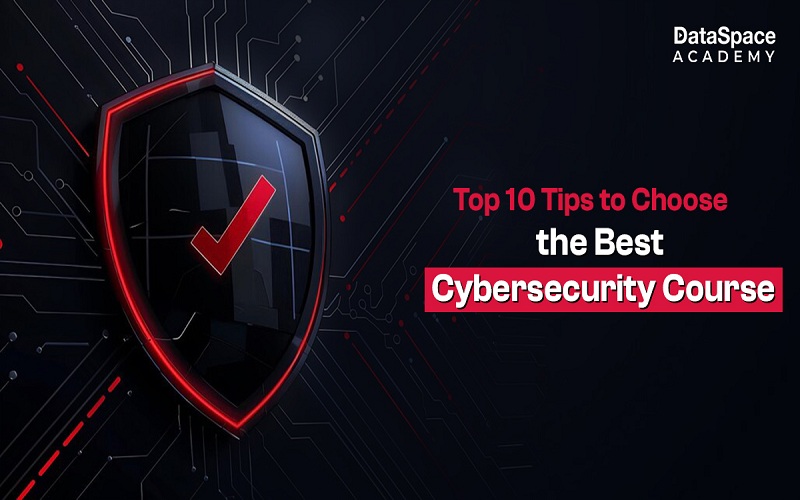Introduction
Cybercrime is the newest emerging threat that has set the alarm bells buzzing. Rising incidents of cyber-attacks and hacks have been plaguing everyone, ranging from citizens to government organisations to SMBs to even Fortune 500 companies. However, on the bright side, the alarming problem has led to an extensive job scope for cybersecurity professionals. Millions of skilled cybersecurity professionals are currently in high demand all across the globe to safeguard identities, data, online networks, and financial assets from highly skilled hackers. Increasing demand for cybersecurity professionals has also prompted the academic world to introduce a range of new on-campus and online cybersecurity degree programs.
Cybersecurity certification courses empower aspiring professionals not only with the industry-leading tools and skills but also with industry-recognised certificates that validate the expertise of the professional. But how to choose the ideal cybersecurity course? The post below offers you a detailed guide on choosing the most credible cybersecurity course for a shining career in cybersecurity.
Steps to Determine the Best Cybersecurity Course
1. Opt for Master’s or Diploma Course
Cybersecurity certifications can be extremely beneficial, and many institutions are now offering bachelor’s degree programs in cybersecurity. But in an industry where salaries are considerably higher than average, earning a Master’s or Diploma degree will leverage your competitive edge. Senior designations in Cybersecurity usually start with a six-figure package.
A masters or equivalent degree in cybersecurity can equip you with the expertise you need to become a leader in any organisation and mitigate highly complex cybersecurity threats. As cyber criminals are getting a step ahead with each passing year, there is a growing need for senior cybersecurity professionals who hold the know-how to handle advanced threats- threats that go far beyond mere password hacking. In that light, earning a master’s degree or Diploma in cybersecurity offers a higher level of job security in the cybersecurity domain than a bachelor’s degree.
2. School Reputation
Below are the tips that will help you find the best academy for a cybersecurity program.
- The school must be able to provide industry-recognised certificate accredited by the EC Council
- The school or academy must boast of high ratings on Google, rating platforms, and leading social media channels
- A reputed school is also backed by rave reviews from a long line of happy students. Some colleges will also provide you with student contacts so that you can contact them personally and request for feedback
- Evaluate the mentors. Check their credentials, including their certificates as well as teaching and professional experience in the field
3. Course Curriculum
Here are the pointers to remember while checking the course curriculum of a cybersecurity program.
- Job-ready course curriculum featuring in-demand industry skills, tools, and knowledge
- Courses covering leading in-demand tools in the current cybersecurity industry
- Detailed course curriculum that starts from the basics and extends to the most advanced level, as per the recent industry standards
- Different levels of courses in cybersecurity so that anybody can join, ranging from freshers to entry-level cybersecurity professionals
- Interactive learning environment so that learners get a better grasp of the course curriculum
- A job curriculum that involves hands-on training and provision to work in real-world projects
It’s extremely important that your chosen academy offers you the provision to sign up for advanced-level courses in the field of cybersecurity. Hackers are getting smarter with each passing year and cybercrimes are getting more complex over time. Businesses and organisations today need highly proficient and advanced cybersecurity professionals who would be able to outsmart the modern hackers. Also, try to choose a multi-disciplinary program that focuses on leadership in conjunction with cybersecurity strategy and management.
4. Faculty Reputation
Faculty credential is another important factor to check out while looking for a credible cybersecurity course. Your chosen academy and faculty panel should be backed by a panel of cybersecurity experts. Make sure the instructors hold the in-demand industry-recognised certifications and credentials. Cybersecurity features an ever-evolving field- the best faculty panel is usually proactive about taking the new advanced courses to stay updated about emerging cybersecurity tools and technologies in the market.
5. Internship and placement opportunities
Your chosen cybersecurity program must offer internship opportunities and internship certificates so that you can work on real-life scenarios to hone up your knowledge. Businesses hiring cybersecurity professionals prefer candidates with practical experience.
Also, find a course that offers placement assistance after the completion of the course and internship.
6. Fees and possibility of financial assistance
While a cybersecurity course is an undeniable career game-changer, the program also demands a significant investment.
Good thing is, some of the cybersecurity courses offer scholarships and grants to help out the students. Leading institutes like DataSpace Academy extend EMI facilities as well to make things more convenient for the learners. So, try to find out a reputed cybersecurity course that provides financial assistance.
8. On-Campus vs. Online Cyber Security Degree Programs
Cybersecurity courses are available both offline and online. Some of the institutions offer a hybrid approach, providing both online and offline classes. If your chosen institute is in close proximity, you can opt for the traditional brick and mortar classroom. But, if you are working somewhere and have plans to take the course after the normal office hours, it’s better to opt for an online class.
The primary advantage of an online class is that you will have the freedom to take the class from the comfort of your own home. Some of the best institutes in the field have designed the class hours keeping working professionals in mind- and you will find a growing number of cybersecurity schools around the world that offer online classes to students abroad.
So, take note of your working hours and routine before choosing your mode of class.
9. Length of Program & Start Dates
You should also check the duration of the course before enrolling into one. If you are looking for a basic experience, choose a course with a duration of 3-5 months. You might wish to upskill after a year and can only afford a few months for the time being. But, if you want extensive knowledge at one go, the course duration will extend 6 months. So, you can’t afford to offer a considerable amount of time to the course at a stretch, find a beginner or intermediate course.
Don’t forget to check the start dates as well. Some courses offer a cybersecurity program just once annually. Some others might offer batches after every few months.
10. Admission Requirements
The eligibility criteria for enrolment in a cybersecurity course might vary from one academy to another. So, before you sign up with your chosen institute, make sure you meet all the needed criteria for admission. For example, some courses are flexible to welcome freshers while there are many programs that only allow learners carrying some basic knowledge in cybersecurity. On the other hand, there are leading cybersecurity training institutions like DataSpace Academy that offer courses for both beginners and experienced candidates.
Conclusion
Cybersecurity is not just about theoretical knowledge, but also about practical skills. It is best suggested to look for programs that offer hands-on learning opportunities that will allow you to apply the knowledge you learn in the classroom to real-world scenarios. This can include access to well-equipped cybersecurity labs, internships, or other experiential learning opportunities. You should also look for programs that offer capstone projects or other opportunities to work on real-world cybersecurity challenges.

